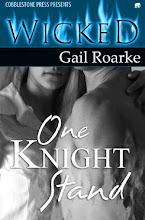Welcome to another weekly post in the How I Write series. This series of posts is the brainchild of Ansha Kotyk, who--along with the other participants, including Yours Truly--haunts the forums (registration required) of the Romance Divas website. You can go here to find a list of all the participants with links to their individual blog posts. We'll each be posting on the same topic each Wednesday for the next two or three months--longer, if it goes well and we're having fun with it.
This week's topic is Motivation, or Getting Through the Dreaded Middle Pages.
I've mentioned Robert Heinlein's Rules For Writers before. Heinlein, for those of you may not who he is (I find it incredible that anyone doesn't know, but the world is a big place...), he was one of the Grandmasters of science fiction. He began his writing career in the fifties, and his rules are as valid today as they were then:
- You must write.
- You must finish what you write.
- You must not rewrite except to editorial order.
- You must mail your story to someone who will buy it.
- You must keep your story in the mail until someone buys it.
I'm afraid there's no magic bullet for this. As with so many things worth doing, there's no quick and easy route to success. It require commitment and discipline. If you can't finish what you start, you're never going to be successful as a writer. But how?
I can only tell you how I do it. I've finished two novels now, and the experience has been consistent so I expect it will continue to be so. For me, it goes like this:
I begin a new project with excitement. Or maybe with fear and trepidation. Or both. After all, it's not easy to write somewhere in the range of 90,000 words of story. It's a monumental task. But so is building a monument, or a skyscraper. Or eating an elephant. And in all those cases, you do it one small task at a time.
So the first step is to recognize that this will not be quick or easy. It's going to take time. Anywhere from days* to weeks to months to years, depending on how much time you can afford to devote to the project, and how fast you write. But if you can consistently apply yourself, whatever your time constraints and writing speed, eventually you'll get to the end. If you need something to reassure you on that point, reread my post from last week, Running The Numbers.
But having started, how do you get through the dreaded middle pages? Give yourself permission to be bad.
One of the most paralyzing things a writer can do is allow his (or her) internal editor to get involved in the writing process. Writing is creative; editing is not. Editing can improve the final product--but there must be raw material to work with before editing becomes useful. So give yourself permission to write something awful. It doesn't matter how awful; it only matters that you write the story. When it's done, you can go back and decide what works and what didn't, what to keep, what to throw out, what to modify. More on this in a moment.
As I mentioned, I've completed two novels now, and in both cases I seesawed between the conviction that they were pretty damn good--and the suspicion that they were awful. But part of the permission to be bad trick is that you must commit to continuing the project no matter how bad you think it is. Whether you think you're the next Shakespeare or you fear that your manuscript's best use is as fuel for a fire, you must keep writing. It can be tough to do, I know.
But here's another secret: You are the worst judge of your own work.
Really. You're simply too close to it. This is especially true when you're in the dreaded middle of it, after the excitement of starting something new has faded, and before you feel the thrill of reaching the end. Then it's just the slog of getting from one to the other. You can't trust your own judgment. This is a common reaction of many (if not all) writers. In fact, two writers I know, a married couple who have each sold scores of novels, tell me it's so common that they've made a joke of it. When one or the other comes storming out of his (or her) office to confess that the new novel isn't working and may have to be scrapped, the other asks, "How far along are you?" At which point, the complaining partner remembers what I'm telling you (and they told me), curses, turns around, and goes back into the office to keep writing.
The great thing about this? About ignoring your own feelings of inadequacy this way? When the novel is finished, if you go back to look for the places where you were sure it was crap, you won't be able to tell by reading which parts you thought rocked, and which you thought sucked. The quality of the writing has little or nothing to do with how you felt about the writing. It's all about your craft, your skill. THAT doesn't vary with your moods, or it won't if you're a professional about it. Just like any other professional--doctors, lawyers, cops, teachers--you put your feelings aside and do the job.
Which is basically how I get through the dreaded middle.
On the days when everything's going well and I'm pleased with my work, I write.
On the days when I think the novel is unsalvageable and I hate it, I write.
There's no other way.
*Joyce Carrol Oates wrote about 9,000 words a day! That's a novel every ten days! But even a few hundred words a day adds up.










It is very true that we are the worst judge of our own work, thank goodness. I think that's what pushes us to get better provided we don't let the discouragement eat us up whole.
ReplyDelete9k a day? She had to have carpel tunnel after that sheesh! Sadly I'm at 500 a day if I'm lucky.
There's lots of wisdom in this post, Gail. Much advice here that I know I need to heed. It's true, I am my own worst judge, and it's true that I need to give myself permission to be bad when drafting.
ReplyDeleteThis, I must admit, is my biggest stumbling block, and you've described it here much better than I attempted to in my post.
Excellent post.
Ansha, yeah 9,000 words a day is incredible. My best day to date is a bit over 5,000 words, and that was very unusual. A good day's work for me is around 3,000 words.
ReplyDeleteTatiana, yes, giving yourself permission to be bad is crucial. Especially since your perception of "good" and "bad" is probably inaccurate anyhow when you're in the middle of the project. Timed writing (60-minute intervals) are a tool I use to keep writing no matter how badly I think it's going.
I love those rules. So true. I've never heard of Robert Heinlein, but I think I might reprint those words somewhere.
ReplyDeleteAnd I'm also guilty of needing to give myself permission to write crap.
Thanks, as always, for a great post Gail!
Thanks for the kind words, Kris. Feel free to repost Heinlein's rules elsewhere--they're valuable to would-be writers of every genre.
ReplyDelete